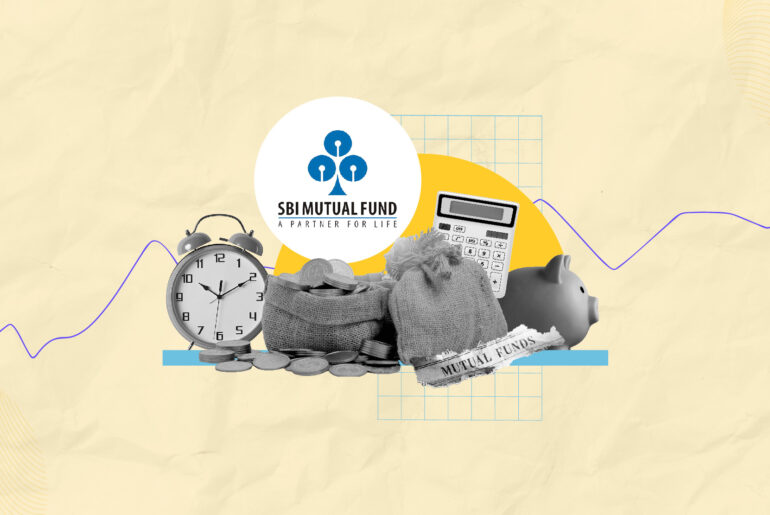Last Updated on Oct 11, 2022 by Aradhana Gotur
The term ‘blue chip’ has its origins in the early 1920s when Oliver Gingold, an employee of Dow Jones, used it to define stocks trading at $200 or above. The term has a direct reference to blue-coloured poker chips that have the highest value. In financial markets today, the term ‘blue chip’ is used to denote stocks of companies that are well-established, have a good reputation or brand value in the market, and have large market capitalization.
But in the context of mutual funds, what is a blue chip fund? Let’s understand in detail what is a blue chip fund.
This article covers:
- What is a blue chip fund?
- Features of blue chip funds
- Benefits of blue chip funds
- Who should invest in blue chip funds?
- Things to check when investing in blue chip funds
Table of Contents
What is a blue chip fund?
A blue chip fund is an equity-oriented mutual fund scheme that invests the majority of its portfolio in blue chip stocks, i.e., quality stocks belonging to established companies. These stocks usually belong to largecap companies, i.e., companies that enjoy a high market capitalization. The fund manager picks stocks belonging only to such companies that exhibit a high potential to yield stable returns and weather out market volatility.
Features of blue chip funds
Here are some of the salient features of blue chip funds that you ought to know about:
- These are equity-oriented funds that are exposed to market risks
- The risks are, however, lower since the stocks enjoy good investor sentiments and their large market capitalization ensures that they are not easily moved by volatility
- Blue chip funds spread your investments within the largecap segment, ensuring diversification across industries
- Blue chip funds have the potential to offer stable and consistent returns to investors
- Being an equity fund, they attract equity taxation. Returns up to Rs 1 lakh are exempted from tax if you hold on to your investments for 12 mth
Benefits of blue chip funds
Some of the benefits of blue chip funds include the following:
1. Potential for good returns
Companies that have established their mettle in the market are popular and are generally preferred by investors. As such, their stock prices have the potential to grow even as they offer stability in volatile market conditions. This growth in the stock prices of blue chip companies affects the portfolio of blue chip mutual fund schemes that invest in such stocks. Hence, the schemes also have the potential to give good returns to investors.
2. Stability in volatile markets
The prices of blue chip stocks do not fluctuate as severely as the prices of midcap or smallcap stocks, even when there is heightened volatility in the market. Since blue chip funds have large exposure to such stocks, their NAVs also do not suffer considerable declines in a falling market. However, it is imperative to note that the same is true in a climbing market situation too. The growth is slow but steady. These funds are, therefore, more stable in volatile markets than other equity schemes that invest in midcap or smallcap stocks.
3. Potential for long-term growth
If you stay invested in blue chip funds with a long-term perspective, your investments grow with consistent returns. Thus, with a long-term perspective, you may be able to accumulate a sizable corpus to meet your financial goals by investing in blue chip funds.
Who should invest in blue chip funds?
Blue chip funds are suitable for all investors who do not mind taking on the risks related to equity investments. Long-term investors can benefit from investing in blue chip funds as, with time, price volatility risks are ironed out while the returns earned can aid with wealth maximization.
Investors keen on equity exposure but are newbies or are unnerved by the volatility of the stock markets may consider investing in blue chip funds as they are relatively stable compared to other equity schemes.
Things to check when investing in blue chip funds
If you have made up your mind to invest in blue chip mutual funds, here are some things that you should consider before you invest:
- Check the expense ratio of the fund. A lower ratio will help fetch you higher returns by minimizing the cost of your investment
- Check the historic returns of the scheme to assess how the fund manager is managing the portfolio. Schemes that have given consistent returns over different tenures are better options as they depict quality portfolio management
- Check the portfolio of the fund and find out its composition. See which stocks the fund has invested in and the proportion of investment. Choose schemes whose portfolio matches your investment style and risk profile
- Compare the returns across different blue chip funds from various Asset Management Companies. Though the size of the fund does not really matter, investors feel a sense of safety when there are more investors showing interest in a fund
- Lastly, measure the fund performance against its benchmark. Ideally, the fund should yield better returns against the benchmark. The wider the difference, the better would be the fund returns
Understand what is a blue chip fund and what its fundamentals are before you invest in one. Also, keep the tax angle in mind at the time of redemption to try and get the benefit of tax exemption on long term capital gains. Invest in blue chip funds with a lower expense ratio that exhibits consistency in past performance for stable returns. Blue chip funds may be considered for their lower risk capability in your equity portfolio.
- Top Fund of Funds (FOF) in India – Full Form, Types & More - Mar 28, 2025
- Bond Funds – Meaning, Types, Risks, and Benefits - Mar 27, 2025
- Money Market Mutual Funds: Meaning, Benefits, Liquidity and Taxation - Mar 13, 2025




